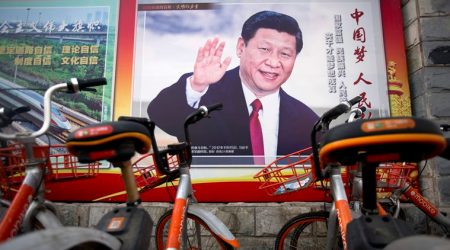 This will allow President Xi Jinping to continue as president indefinitely.
This will allow President Xi Jinping to continue as president indefinitely.
China’s parliament on Sunday amended the constitution to remove the limit on presidential terms. The amendment will allow President Xi Jinping, 64, who is seen as the most powerful Chinese leader in the post-Mao Zedong era, to keep power indefinitely.
The support to strike down the two term-limit was nearly unanimous.
The 13th National People’s Congress (NPC), the national legislature, has a strength of 2,980 deputies. A total of 2,964 votes were cast in favour of the amendment while only two were against. Three members abstained from voting while one vote was invalid. The ballot was secret and those who cast the dissenting votes were not identified.
READ: Timeline of Xi Jinping’s rise as China’s leader-for-life
A constitutional change requires the approval of two-thirds or more of NPC deputies during the annual session.
Xi, who assumed office in March 2013 and began his second term in October 2017, received over 99.89 per cent of the total votes. Without the amendment Xi’s two term presidency would have ended in 2023.
The two-term limit for presidents had been enshrined in the Chinese Constitution in 1982 to ensure leaders do not occupy the top post indefinitely.
READ: China’s Amit Shah Wang Huning is behind the scenes as Xi Jinping becomes president for life
The Communist Party of China’s Central Committee had last month proposed to remove the limit on the terms of the President and Vice-President that prevented them from serving “no more than two consecutive terms”.
There had been consternation internationally and some muted criticism within China that Xi’s indefinite rule could push China towards one-man dictatorship.
The Chinese government rejected the apprehensions saying the amendment had the people’s support.
“This amendment when it was brought in was applauded twice by the members. Without political support and support of society this would not have happened. There is no problem with this amendment,” said 12th NPC Standing Committee’s Commission for Legislative Affairs Chairman Shen Chunyao.
The NPC cleared 21 other constitutional amendments including incorporating Xi’s political theory “Thought on Socialism with Chinese Characteristics for a New Era” into the country’s Constitution.
This was the first amendment to the country’s fundamental law in 14 years.
The current version of the Constitution was adopted during the 5th National People’s Congress on December 4, 1982.
For all the latest World News, download Indian Express App
- Mar 12, 2018 at 1:20 amNow our comrade Yechury should do the same and declare himself permanent general sec of CPM. Like islam, even commies are not compatible with democracy, but ally with each other whenever they have to fight civilized/democratic/native cultures.Reply
- Mar 12, 2018 at 12:18 amThe great Chinese civil war or revolt is coming. looking forward to see 7 pieces of china. Bharat maata ki jai.Reply
- Mar 11, 2018 at 11:05 pmWe should also make Shri Modiji the Prime Minister and President for life , and do away with unnecessary expensive elections. Only Modiji can make India into a fully developed Nation .Reply
- Mar 11, 2018 at 10:06 pmBehold the Xi dynasty. Even the CCP has been rendered impotent. The world will next witness the theater of the succession which of Xi's children will be groomed to take over the empireReply
- Mar 11, 2018 at 8:45 pmCPC came to power by brutally dismantling the old system. It controls everything, and everyone fears it's authority. Historically CPC has been as corrupt as any party. What is good about CPC that it has survived for so long. The answer lies in... It has mutated over time, changing national narratives, which have catapulted poor China to become poverty-free china, though still not free of corruption. It is vitally important for CPC to generate s and wealth for the masses, so that it is not rejected by masses, even if it takes away their basic rights. We have an opposite challenge facing us. Democracy and resultant knee jerk five yearly changes in developmental policies has lead to long term failures and poverty. We need a solid reform in our British Era political and bureaucratic system. Political reforms should insure exclusion of radical and inept people contesting elections. Development programs once finalized, should be implemented until completion, totally immune to politics.Reply
- Load More Comments


























